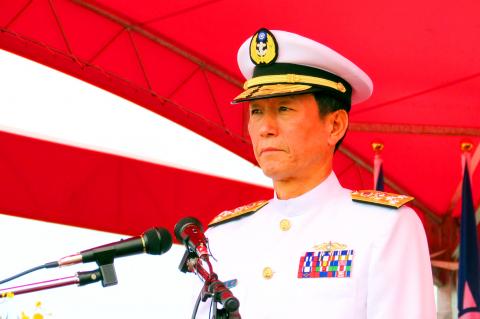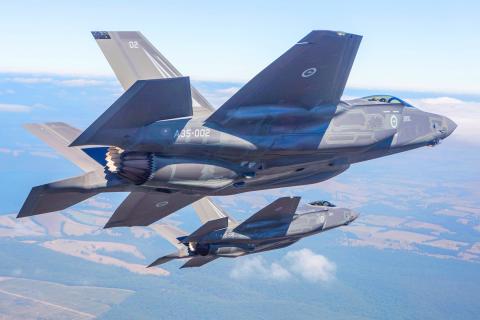The Ministry of National Defense yesterday confirmed President Tsai Ing-wen’s (蔡英文) appointment of Deputy Minister of National Defense Lee Hsi-ming (李喜明) as the nation’s new chief of the general staff, among a reshuffle of positions at the top of the military and the ministry.
Lee is to fill the position left vacant by Chief of the General Staff Chiu Kuo-cheng (邱國正), who assumed the post in December last year, but will reach the retirement age of 64 for the position by the end of this month.
Chiu turned down an invitation to extend his term, saying that the system of elevation of rank should be respected and that he would be retiring at the end of this month, sources who requested anonymity said.

Photo: CNA
Lee’s ministry post is to be filled by another admiral, Deputy Chief of the General Staff Pu Tze-chun (蒲澤春), while Deputy Commander of the Army Lieutenant General Chen Pao-yu (陳寶餘) is to take over from Pu and be promoted to general.
Deputy Minister of National Defense General Cheng Te-mei (鄭德美) is to transfer to the Presidential Office to act as Tsai’s strategic adviser, the ministry said in a statement, adding that Chungshan Institute of Science and Technology president Chang Guan-chung (張冠群) would fill Cheng’s position and would be promoted to general.
Chang’s promotion would be the first time an academic has taken a post as deputy minister of national defense, the sources said.

Photo: AFP
The reassignments are set to take effect on May 1.
Meanwhile, Minister of National Defense Feng Shih-kuan (馮世寬) yesterday told a meeting of the legislature’s Foreign Affairs and Defense Committee that the ministry would formally declare its intention to procure Lockheed Martin F-35 jets to US officials in July when Washington is expected to finalize its appointment of Taiwan affairs officials.
Asked by Democratic Progressive Party Legislator Lo Chih-cheng (羅致政) if the ministry would be seeking F-35s, Feng said that the ministry “has such a plan in response to the enemy’s military development.”
“Because the appointments of [US] officials have not yet been completed, [a formal proposal] would be made to Washington in July,” he said.
The military wants F-35s because their short takeoff and vertical landing capabilities, as well as their advanced stealth features, would allow the air force to retain combat capacity should its air bases be destroyed.
The attempt to acquire F-35s became the main topic of yesterday’s legislative session after the ministry announced that it would test the nation’s defensive capabilities with F-35s factored in during the computer simulation in this year’s Han Kuang exercises.
The simulation would be based on the cross-strait military balance in 2025, when Chinese People’s Liberation Army is expected to have three aircraft carriers and a fleet of Sukhoi Su-35 jets, Lieutenant General Chiang Chen-chung (姜振中) said.

ACTION PLAN: Taiwan would expand procurement from the US and encourage more companies to invest in the US to deepen bilateral cooperation, Lai said The government would not impose reciprocal tariffs in retaliation against US levies, President William Lai (賴清德) said yesterday, as he announced five strategies to address the issue, including pledging to increase Taiwanese companies’ investments in the US. Lai has in the past few days met with administrative and national security officials, as well as representatives from various industries, to explore countermeasures after US President Donald Trump on Wednesday last week announced a 32 percent duty on Taiwanese imports. In a video released yesterday evening, Lai said that Taiwan would not retaliate against the US with higher tariffs and Taiwanese companies’ commitments to

Intelligence agents have recorded 510,000 instances of “controversial information” being spread online by the Chinese Communist Party (CCP) so far this year, the National Security Bureau (NSB) said in a report yesterday, as it warned of artificial intelligence (AI) being employed to generate destabilizing misinformation. The bureau submitted a written report to the Legislative Yuan in preparation for National Security Bureau Director-General Tsai Ming-yen’s (蔡明彥) appearance before the Foreign Affairs and National Defense Committee today. The CCP has been using cognitive warfare to divide Taiwanese society by commenting on controversial issues such as Taiwan Semiconductor Manufacturing Co’s (TSMC, 台積電) investments in the

HELPING HAND: The steering committee of the National Stabilization Fund is expected to hold a meeting to discuss how and when to utilize the fund to help buffer the sell-off The TAIEX plunged 2,065.87 points, or 9.7 percent, to close at 19,232.35 yesterday, the highest single-day percentage loss on record, as investors braced for US President Donald Trump’s tariffs after an extended holiday weekend. Amid the pessimistic atmosphere, 945 listed companies led by large-cap stocks — including Taiwan Semiconductor Manufacturing Co (TSMC, 台積電), Hon Hai Precision Industry Co (鴻海精密) and Largan Precision Co (大立光) — fell by the daily maximum of 10 percent at the close, Taiwan Stock Exchange data showed. The number of listed companies ending limit-down set a new record, the exchange said. The TAIEX plunged by daily maxiumu in just

‘COMPREHENSIVE PLAN’: Lin Chia-lung said that the government was ready to talk about a variety of issues, including investment in and purchases from the US The National Stabilization Fund (NSF) yesterday announced that it would step in to staunch stock market losses for the ninth time in the nation’s history. An NSF board meeting, originally scheduled for Monday next week, was moved to yesterday after stocks plummeted in the wake of US President Donald Trump’s announcement of 32 percent tariffs on Taiwan on Wednesday last week. Board members voted to support the stock market with the NT$500 billion (US$15.15 billion) fund, with injections of funds to begin as soon as today. The NSF in 2000 injected NT$120 billion to stabilize stocks, the most ever. The lowest amount it